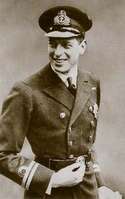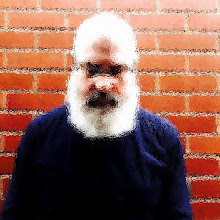 Prince George, Duke of Kent
Prince George, Duke of Kent born 20 December 1902 (d. 1942)
The
Prince George, Duke of Kent (George Edward Alexander Edmund) was a member of the British Royal Family, the fourth son of King George V. He held the title of Duke of Kent from 1934 to his death in 1942.
Prince George is remembered for having had a rather more interesting personal life than is the norm in the twentieth century Royal Family, as well as the circumstances of his death at the height of World War II.
Prince George received his early education from a tutor and then prep school. At age thirteen, like his brothers Prince Edward (later Edward VIII) and Prince Albert (later George VI) before him, he went to naval college, first at Osborne and later at Dartmouth. He remained in the Royal Navy, which he hated, until 1929, serving on the
Iron Duke and later the
Nelson. After leaving the navy, he briefly held posts at the Foreign Office and later the Home Office, becoming the first member of the British Royal Family to work as a civil servant.

Handsome and glamorous, the Duke of Kent was unarguably the most interesting, intelligent and cultivated member of his generation of the Royal Family. He took a strong interest in the arts, theatre, and in interior decoration, an interest he shared with Queen Mary but no other member of the family. He had a long string of affairs with men and women before and during his marriage. The better known of his partners were cabaret singer Florence Mills, banking heiress Poppy Baring, Ethel Margaret Whigham (later Duchess of Argyll), musical star Jessie Matthews and actor
Noel Coward, with whom he carried on a 19-year affair. Love letters from the Duke to Coward are believed to have been stolen from Coward's house in 1942
The Duke of Kent is also said to have been addicted to drugs (notably morphine and cocaine) — a weakness which his brother the Prince of Wales (not an otherwise notably respectable member of the family) was reputed to cure him of during the latter part of the 1920s — and reportedly was blackmailed by a male prostitute to whom he wrote intimate letters. Another of his reported homosexual affairs was with his distant cousin Louis Ferdinand, Prince of Prussia; homosexual spy and art historian
Anthony Blunt was reputedly another lover. The Duke was known to have attempted to court Queen Juliana of the Netherlands (mother of the current Queen Beatrix).
In addition to his legitimate children, the Duke is said to have had a son by Kiki Preston (née Alice Gwynne), an American socialite known as 'the girl with the silver syringe', whom he reportedly shared in a ménage à trois with Jorge Ferrara, the bisexual son of the Argentine ambassador to the Court of St. James's.

On 29 November 1934, the Duke of Kent married Princess Marina of Greece and Denmark. It was the last marriage between a son of a British Sovereign and a member of a foreign royal house to date. The marriage was not however arranged - he met the intelligent, cultivated and elegant Marina through his circle of friends and she proved to be an ideal and suitable match.
At the start of World War II, he returned to nominally active military service at the rank of Rear Admiral, briefly serving on the Intelligence Division of the Admiralty. In April, 1940, he transferred to the Royal Air Force. He temporarily relinquished his rank as Air Vice-Marshal (the equivalent of Rear Admiral) to assume the post of Staff Officer in the RAF Training Command at the rank of Air Commodore.
The Duke was killed in a plane crash on active service in World War II at Eagles Rock near Dunbeath, Caithness, Scotland on August 25, 1942. The Short Sunderland he was flying in was officially heading to Iceland where the Duke was to meet senior members of the US military. However the Duke's death at the height of World War II has led to various conspiracy theories surrounding the plane crash. Some theories state that the Duke was actually heading to Sweden for secret peace talks with the Germans. Related to this are claims that the Duke was travelling with Rudolf Hess, the deputy to Adolf Hitler; a reported additional, unexplained body at the scene of the crash has been attributed as Hess's, with the man later tried at Nuremberg allegedly an impostor. Other claims state the Duke was at the controls of the plane, and his inexperience may have caused the plane to crash.
In 2003, Channel 4 broadcast an alternative theory. This stated that the Duke was involved in the events surrounding the capture of Rudolf Hess. This theory however, states that the Duke was working with British Intelligence as part of a plot to fool the Nazis into thinking that the Duke was plotting with other senior figures to overthrow Winston Churchill.
Prince George's three children are still active members of the royal family - Prince Edward, Duke of Kent, Princess Alexandra and Prince Michael of Kent.
Labels: Bisexuals, Death by accident, Death in conflict, Royalty, World War 2
 Edgar Bowers born 2 March 1924 (d. 2000)
Edgar Bowers born 2 March 1924 (d. 2000) For a decade he taught at several universities including Duke University and Harpur College. He then settled at the University of California at Santa Barbara where he stayed for 30 years until he retired in 1991. He was a member of the English Faculty where he specialised in English Renaissance and modern poetry.
For a decade he taught at several universities including Duke University and Harpur College. He then settled at the University of California at Santa Barbara where he stayed for 30 years until he retired in 1991. He was a member of the English Faculty where he specialised in English Renaissance and modern poetry.






